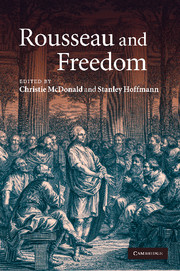Book contents
- Frontmatter
- Contents
- List of illustrations
- Notes on contributors
- Acknowledgments
- List of abbreviations
- Introduction
- PART I
- PART II
- 7 The Social Contract, or the mirage of the general will
- 8 “Par le bon usage de ma liberté”: freedom and Rousseau's reconstituted Christianity
- 9 The constraints of liberty at the scene of instruction
- 10 “Toutes mes idées sont en images”: Rousseau and the yoke of necessity
- 11 Rousseau's ruins
- 12 Can woman be free?
- 13 The subject and its body: love of oneself and freedom in the thought of Rousseau
- PART III
- Bibliography
- Index
13 - The subject and its body: love of oneself and freedom in the thought of Rousseau
Published online by Cambridge University Press: 05 May 2010
- Frontmatter
- Contents
- List of illustrations
- Notes on contributors
- Acknowledgments
- List of abbreviations
- Introduction
- PART I
- PART II
- 7 The Social Contract, or the mirage of the general will
- 8 “Par le bon usage de ma liberté”: freedom and Rousseau's reconstituted Christianity
- 9 The constraints of liberty at the scene of instruction
- 10 “Toutes mes idées sont en images”: Rousseau and the yoke of necessity
- 11 Rousseau's ruins
- 12 Can woman be free?
- 13 The subject and its body: love of oneself and freedom in the thought of Rousseau
- PART III
- Bibliography
- Index
Summary
We seek to illuminate Rousseau's vision of freedom by examining it through the prism of the subject's relationship with its own body. It is well known that, in Rousseau's works, this relationship forms the basis for a central notion, that of amour de soi, or love of oneself. However, the specific mode of this phenomenon, which is both a feeling and a modality of one's relationship to oneself, still remains to be defined. The question of the relationship between the subject and its body presents a choice between two alternatives (others are conceivable, but these two are essential): on the one hand, a proprietarist vision that still informs many discourses on freedom today (witness the feminist slogan “my body is mine”) and, on the other, a perspective according to which this relationship could or should be conceived of in a nondualistic fashion, a perspective that, in our view, is delineated by Rousseau.
Such an interpretation clearly contradicts the most common and most classical readings of Rousseau's work. Those readings tend, on the contrary, to underscore his “spontaneous dualism,” his affirmation of a Platonism reinterpreted through the lens of Cartesian and Christian thought, and the importance of the opposition between body and soul. However, we believe that a nondualist interpretation is fruitful and well founded. Most of the passages in which Rousseau proclaims a clear-cut dichotomy between soul and body are couched within a religious or metaphysical context (especially when death is evoked as a form of deliverance).
- Type
- Chapter
- Information
- Rousseau and Freedom , pp. 216 - 228Publisher: Cambridge University PressPrint publication year: 2010
- 1
- Cited by



